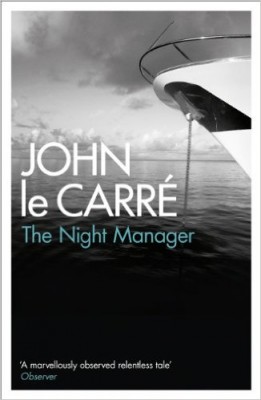
I am an unashamed Le Carre fan. I think novels like The Spy Who Came In From the Cold and Tinker Tailor Soldier Spy are pretty much as good as the espionage genre gets (or at least has got thus far). (I should disclose upfront that I’m not a fan of Ian Fleming, so feel free to form an opinion about that.) However, my heart belongs to Le Carre’s greatest character, George Smiley, so I may not have read this particular novel if it wasn’t for the BBC adaptation starring Tom Hiddleston and Hugh Laurie (to say nothing of the glorious Olivia Colman).
All the stuff I love (except Smiley) is back in this novel, which is set in the 90s soon after the fall of the Soviet Union (the miniseries is moved to the Arab Spring). The night manager of the title is Jonathan Pine, an Englishman working in hotels abroad who develops an enmity against a purveyor of illicit arms and drugs, and is recruited by British Intelligence to bring him down. Helpfully, this good Samaritan has an army background, so there are excuses for his knowledge and some, at least, of his skills that put off the failure of the suspension of disbelief to the extent that that’s possible in a spy novel. Granted, the middle section drags: in order to provide a background for Jonathan’s attempt to ingratiate himself into the villain’s inner cadre, he spends a large chunk of time and novel living in remote towns and committing petty and not-so-petty crimes, under the invisible eye of his handler. I can see why it was narratively necessary, but I suspect it could have been done in fewer words.
Le Carre himself worked in intelligence for a time – he left his job in the aftermath of the Kim Philby affair – and there are two main ways to feel about the effect this experience has on his novels. On the one hand, they’re more realistic than any others when it comes to when he calls the “espiocrats”, the sparring power-hungry London public servants whose machinations put real lives in the field at risk. On the other, very few people pick up a spy novel hoping to find a detailed account of bureaucratic finagling. The real trick is to have just enough espiocracy to provide a double threat against the agent – from inside and outside the agency – and not so much that the reader begins to wish for death him- or herself. (I’m speaking generally – what made Tinker Tailor such a remarkable feat was that the threat was almost all from inside the agency, but Le Carre managed to keep the tension running high enough that it didn’t matter.) The balance is just about there in The Night Manager, though some early scenes involving Pine’s handlers seem a bit inexplicable at the time.
Something you might want to know before you start: the ending is not exactly what I wanted. Not all aspects of the plot are resolved how the reader would like them to be resolved. It’s also safe to say that there are very few women who are not included because they’re the property of a male character (with the exception of some espiocrats who are strictly background dressing), and I don’t love the depiction of an Egyptian police officer’s broken English. So. Caveat lector I guess.